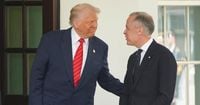In a high-stakes meeting on May 6, 2025, Canadian Prime Minister Mark Carney firmly rejected President Donald Trump’s provocative suggestion that Canada could become the 51st state. During their first in-person meeting in the Oval Office, Carney stated unequivocally, "Canada is not for sale, it will never be for sale," emphasizing the longstanding sovereignty of his nation.
Despite Carney's firm stance, Trump maintained a somewhat playful demeanor, responding with, "Never say never," indicating that he remained open to the idea, albeit in a joking manner. The exchange underscored the complex and often contentious relationship between the two neighboring countries, which has been marred by trade disputes and tariffs.
Carney, who recently won the Canadian election largely due to his anti-Trump platform, attempted to steer the conversation toward the importance of Canada as a key trading partner for the United States. In a bid to highlight the economic ties, he asserted, "We are the largest client of the United States in the totality of all the goods." This statement aimed to remind Trump of the mutual benefits of maintaining a strong trade relationship.
However, the meeting quickly turned to the contentious issue of tariffs, which have been a significant point of contention between the two nations. Trump reiterated his position, stating that there was nothing Carney could say to convince him to lift the tariffs currently imposed on Canadian goods, which include a 25% levy on products not compliant with the United States-Mexico-Canada Agreement (USMCA), as well as additional tariffs on cars, oil, steel, and aluminum.
Trump’s tariffs have strained the historically friendly U.S.-Canada relationship, with Carney noting that the current tariff regime was "taking advantage" of the USMCA. He emphasized the need for a broader negotiation to address these issues, indicating that some aspects of the agreement would need to change. "There are many opportunities to work together, and I look forward to addressing those issues that we have," Carney stated.
As the meeting progressed, both leaders attempted to project a sense of camaraderie. Trump congratulated Carney on his election victory, calling him a "very talented person" and suggesting that their meeting would be a friendly affair, unlike his previous contentious encounters with other world leaders. Trump remarked, "This is very friendly. This is not going to be like -- we had another little blowup with somebody else," referring to his earlier spat with Ukrainian President Volodymyr Zelenskyy.
Despite the cordial atmosphere, the impasse over tariffs was palpable. Trump’s comments about Canada’s economic contributions seemed dismissive at times, as he suggested, "We don’t really want cars from Canada. We don’t want steel from Canada, because we make our own steel." This sentiment drew criticism from Canadian officials, who noted the interdependence of the two economies.
Ontario Premier Doug Ford, reacting to Trump's comments, stated, "Even the Trump supporters are saying, 'This is crazy what he’s doing.'" Ford highlighted the importance of Canadian resources, asserting, "Imagine if they didn’t have the uranium, they wouldn’t have any nuclear power down there." He emphasized that Canada’s contributions to U.S. energy needs were vital.
Carney’s approach during the meeting was marked by a blend of diplomacy and firmness. He referred to Trump as a "transformational president" and expressed a desire to work together despite the challenges. "The history of Canada and the U.S. is: We’re stronger when we work together," he said, aiming to find common ground.
In the wake of the meeting, Carney described the discussions as "constructive," indicating that he felt more optimistic about the bilateral relationship than before. He noted that both sides agreed to continue trade discussions at various levels and planned to meet again at the upcoming G-7 summit in Banff next month.
Trump, for his part, described the meeting as a "great meeting" and insisted that there was "no tension" between the two leaders. However, the underlying issues regarding tariffs and trade remained unresolved, with both leaders acknowledging that more discussions would be necessary.
As the meeting concluded, the future of U.S.-Canada relations remained uncertain. Both leaders recognized the need for dialogue but were clearly at odds over key issues. Carney’s firm stance on Canada’s sovereignty and trade rights contrasted sharply with Trump’s aggressive tariff policies, setting the stage for a complex negotiation process ahead.
In summary, the meeting between Carney and Trump highlighted the delicate balance of power and negotiation between the two nations. While both leaders expressed a desire to improve relations, significant challenges lie ahead, particularly in addressing the contentious tariff regime that has strained their partnership.




